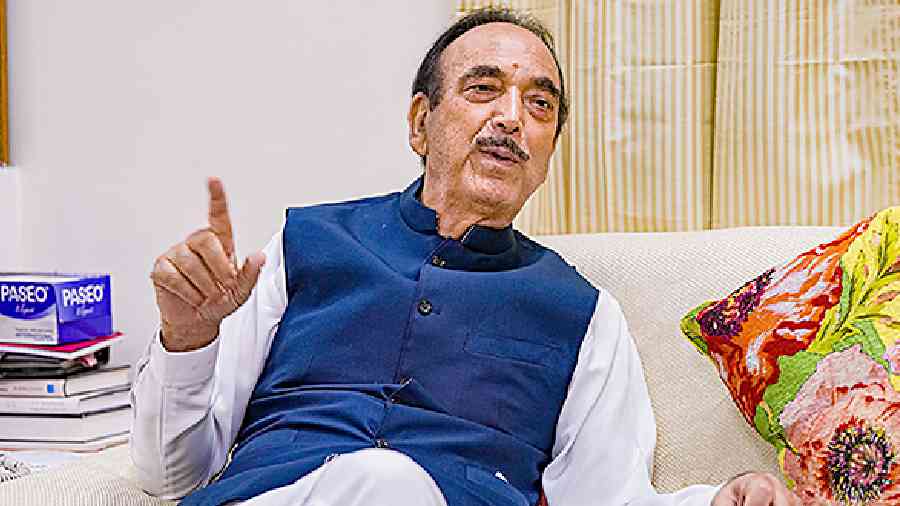Ghulam Nabi Azad, who spent his political life fighting the RSS ideology, now doesn’t agree with the Opposition’s narrative about democracy and secularism being in peril, insisting that all governments and parties have faced such accusations in the past.
Azad, who left the Congress last year and floated his own party, avoided attacking Prime Minister Narendra Modi in the course of a conversation with The Telegraph about his autobiography that is to be released this week. He went so far as to say that ministers were to be blamed for not allowing discussions in Parliament because the Prime Minister himself wants every issue debated.
The book, called Azaad and published by Rupa, also reflects this sentiment, dwelling on the present condition of the Congress and declaring that “the BJP is happy to face this kind of Opposition that hardly poses any challenge”.
Excerpts from the interview:
Q: You have been a Congressman all your life. Your autobiography looks like a commentary on contemporary Congress politics. How do you feel getting disconnected from the party at the fag end of your political career?
A: I have started a new innings; age is not a factor in politics. I am zero in comparison with great leaders like Jay Prakash Narayan, but he came back after retirement and toppled the most powerful lady of the millennium (Indira Gandhi). It is people’s power, not any leader’s power.
Q: You have been ideologically opposed to the RSS. There is a perception that your outlook has changed.
A: See my speeches in Parliament. I haven’t named the RSS like some leaders do. I oppose the policies of the government, I don’t attack individuals. Today, some leaders have the habit of abusing individuals. I don’t abuse individuals.
Q: You have written in your book about this. You said you never called the Prime Minister names while some leaders abused him to please the Congress leadership. You said parties should not cross the Lakshman rekha. But Opposition parties say Modi himself ran a politics of defamation, harassment and intimidation. His conduct hasn’t been prime ministerial.
A: I have always said vindictive politics will not work in a democracy. In 1975, you put everybody in jail. When they point out what happened during the Emergency, the Congress has no answer.
Q: But political scientists argue Indira Gandhi didn’t have any political agenda of killing democracy. The Emergency was an aberration. Indira was a democrat, but Modi isn’t.
A: Degrees differ. The policy should be live and let live. Everybody has his own way of thinking. Leftists think in one way, Rightists think differently. But it is true that vindictiveness has increased in recent times.
Q: Do you still believe the RSS-BJP has harmed India’s social fabric? You said so for decades.
A: Every political party faced such allegations. Casteism, who is responsible? Communalism, who is responsible? Maybe the BJP has harmed more. But there is not one political party that hasn’t harmed the country. Some less, some more.
Q: The dominant view is that democracy is in peril like never before.
A: This was said during the Emergency also. No political party can say democracy is in danger in Regime A and wasn’t in danger in Regime B. Even in the states, many governments have been blamed for a dictatorial attitude. The degree may be less or more. Some do it openly, some secretly.
Q: Will it be good for the country if Modi wins 2024?
A: How can I know who will win? Indira lost after the Emergency. Vajpayee lost when they ran the India Shining campaign. We gave one of the best governances from 2004 to 2014 but we lost so badly.










